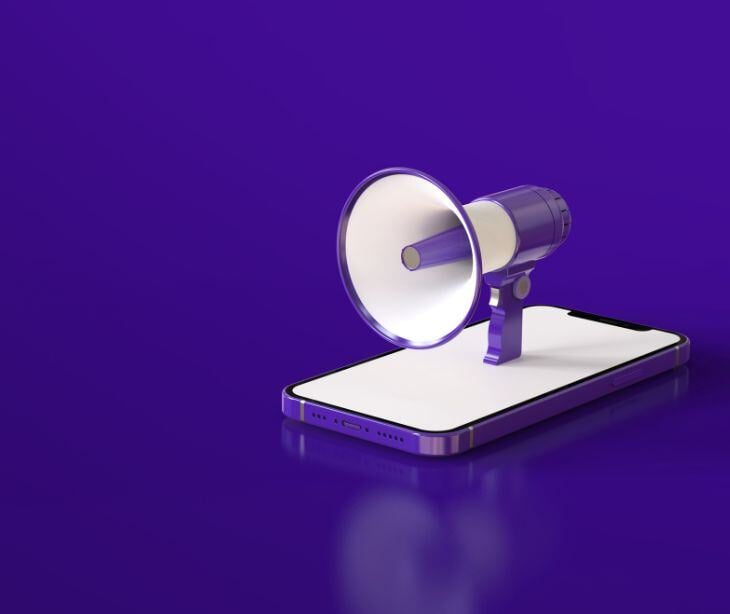5 min read
The best HIPAA complaint text messaging healthcare marketing strategies
Kirsten Peremore
March 25, 2025

Marketing strategies offer a twofold benefit to healthcare organizations by providing a method of brand building and educating patients through well-thought-out campaigns. The practice also helps healthcare providers differentiate themselves within competitive markets. Text messaging has proven an effective tool in this regard, with Statista reporting that 31% of business owners use the medium due to high open and click-through rates and one in three using it for cost-effectiveness.
The value of personalization in marketing
A study titled Psychology & Marketing provides the following insight, “The core of personalization revolves around the six most prominent questions to cue the classification of personalization based on the following: (1) what is personalized; (2) how the personalized design is communicated to the customer; (3) who does the personalization; (4) what kinds of data are used; and (5) where the data comes from; and (6) how it is personalized.”
Personalization in marketing refers to tailoring content, messaging, and experiences to individual customers based on their unique characteristics, behaviors, and preferences. It moves beyond generic, one-size-fits-all approaches to create more relevant and engaging interactions. Its value lies in its ability to enhance customer experience, increase engagement, improve buyer targeting, and build stronger brand reputation, ultimately leading to increased revenue and customer loyalty.
For healthcare organizations, personalization holds immense value due to the inherently personal nature of healthcare. Every patient has a unique medical story, risk factors, and needs. Personalized marketing allows healthcare providers to deliver targeted messages and solutions that address individual health concerns, improving patient engagement and better health outcomes. For example, sending personalized reminders for preventive screenings or medication adherence can significantly improve patient compliance and reduce hospitalizations.
How segmentation helps improve marketing efficacy
Segmentation acknowledges that consumer markets are heterogeneous, and treating them as monolithic entities leads to diluted messaging, wasted resources, and missed opportunities. A study published in the Journal of Marketing Management provides, “The importance of the market segmentation approach has already been stressed in the introduction to this paper. It can help to set the basic objectives for the whole marketing operation, and to indicate appropriate strategies by which these objectives can be realised.”
By dividing audiences into smaller, homogenous segments, demographic, geographic, behavioral, or psychographic, businesses can craft hyper-targeted campaigns that resonate more deeply with specific subgroups.
The efficacy of segmentation hinges on data-driven insights. Behavioral segmentation, for example, leverages purchase history or online activity to predict future actions, allowing marketers to deploy timely, relevant interventions, such as retargeting ads for abandoned carts or personalized loyalty rewards for frequent buyers.
Similarly, psychographic segmentation, which considers values or lifestyle, can unlock emotional connections that drive brand loyalty. These strategies reduce marketing waste and amplify impact by ensuring messages align with the intrinsic motivations of each segment. Segmentation also has a value that goes beyond tactical messaging. Through the identification of underserved or high-potential segments, healthcare organizations can innovate products or services to meet unmet needs among patients.
The core marketing strategies to apply through text messaging
Personalization
According to a LAB University of Applied Sciences study, “Personalization enables marketers to unlock a deeper level of customer engagement, forging stronger and more enduring connections with their clientele.” Personalization in healthcare text messaging marketing operates through data-driven segmentation, tailored content delivery, and compliance-focused technology.
The LAB study also states, “The ability to deliver such personalized experiences hinges on two pivotal technological components. Firstly, it relies on harnessing real-time data, a powerful resource that facilitates the dynamic launch, assessment, and refinement of campaigns as they unfold. Secondly, automation plays a crucial role in ensuring that customers receive messages precisely when they are most relevant in their individual customer journey.”
Paubox Marketing integrates HIPAA compliant encryption and targeted communication. The marketing process begins with audience segmentation, where patient data (e.g., health conditions, appointment history, demographics) is analyzed to group individuals into cohorts requiring distinct messaging.
Personalization is executed through dynamic content generation, where systems like Paubox Marketing use pre-built templates or AI-driven tools to insert patient-specific details (e.g., names, appointment times) into messages while adhering to strict privacy protocols. The approach balances intimacy with professionalism.
Cross channel integration
Synchronizing messaging, data, and customer interactions across platforms like text messaging, email, social media, and physical channels, allows businesses to create a cohesive journey that aligns with how customers naturally interact with brands. Research published in Forbes shows that campaigns using three or more channels achieve 287% higher purchase rates compared to single-channel efforts, highlighting the value of unified outreach. It operates through data-driven personalization, where customer interactions on one channel (e.g., a website visit) trigger tailored follow-ups via another (e.g., SMS reminders or email offers).
Text messaging has become a major channel in this ecosystem due to its immediacy and accessibility. SMS campaigns can amplify engagement by delivering hyper-relevant, time-sensitive messages when integrated with other platforms.
Event-driven campaigns
A study published in Database Marketing & Customer Strategy Management states, “The customer lifecycle stages are influenced of many events (triggers). Based on customer data analysis, the event-driven relationship approach can be implemented. The idea is to identify the relationship-altering events or ‘ moments of truth ’for the customer. These events affect the requirements and expectations of specific customer.”
In healthcare, event-driven campaigns are particularly effective because they align messaging with moments of heightened patient engagement or need, such as post-discharge follow-ups, appointment confirmations, or medication refill reminders. A patient’s discharge from a hospital could trigger an automated SMS campaign offering recovery guidelines, while a missed appointment might initiate a rescheduling prompt.
Building consistent brand messaging
Brand consistency depends on aligning SMS content with established visual, tonal, and thematic guidelines across all touchpoints. According to N.Peddisetty, a consultant at Dell Technologies, “Due to brand consistency comes brand familiarity. This helps build trust among customers and helps develop a long-term relationship with the customers amidst stiff competition. Brand consistency ensures customers can differentiate easily between this brand and other competitors and help with repeat customers.”
The study goes on to note, “Brand messaging considers the mission, vision, and the core values of the company. Messaging also considers the target audience.”
A healthcare provider concerned about patient-centered care might use SMS to send appointment reminders phrased in a warm, empathetic tone that mirrors their website and social media voice, ensuring a cohesive narrative. It prevents disjointed experiences, as patients encounter the same brand personality whether interacting via text, email, or in-person visits.
Segmentation and relevance are necessary to maintain consistency without alienating audiences. By categorizing patients based on health conditions or care stages (e.g., prenatal vs. chronic disease management), organizations can tailor SMS content to specific needs while adhering to overarching brand themes.
HIPAA compliance in healthcare marketing strategies
HIPAA imposes strict boundaries on healthcare marketing practices, primarily through its Privacy Rule. Under HIPAA, marketing is defined as “a communication about a product or service that encourages recipients to purchase or use it”.
The Privacy Rule prohibits the use or disclosure of protected health information (PHI) for marketing purposes without explicit patient authorization, except in two narrow circumstances:
- face-to-face communications (e.g., a clinician discussing a new service during an appointment)
- promotional gifts of nominal value (e.g., free samples of vitamins at a clinic).
Specific restrictions include:
- Any marketing campaign leveraging PHI, such as targeted ads for diabetes supplies based on patient records, requires written authorization that specifies the intended use.
- Appointment reminders or medication adherence prompts are exempt from authorization requirements because they directly support care.
- Health education (e.g., flu shot alerts) is permissible if it does not promote a specific paid product or service.
- If a covered entity receives payment from a third party for marketing (e.g., a clinic earning commissions for promoting a partner’s medical device), authorization must disclose this financial relationship.
FAQs
What types of marketing require HIPAA compliance?
Any marketing that involves the use of PHI, such as targeted marketing based on patient data or using patient testimonials, requires HIPAA compliance. However, general demographic targeting does not fall under HIPAA.
How do I obtain patient consent for marketing communications?
Patient consent must be obtained through clear opt-in forms that explain the purpose of the communication.
What is the purpose of the HIPAA Privacy Rule in marketing?
The HIPAA Privacy Rule establishes standards to protect individuals' medical records and other individually identifiable health information.
What are the consequences of non-compliance with HIPAA in marketing?
Penalties can include fines ranging from $100 to $50,000 per violation, with a maximum annual penalty of $1.5 million.
Can marketing agencies be considered business associates under HIPAA?
Yes, marketing agencies working with healthcare providers are considered business associates and must comply with HIPAA.
Subscribe to Paubox Weekly
Every Friday we'll bring you the most important news from Paubox. Our aim is to make you smarter, faster.




